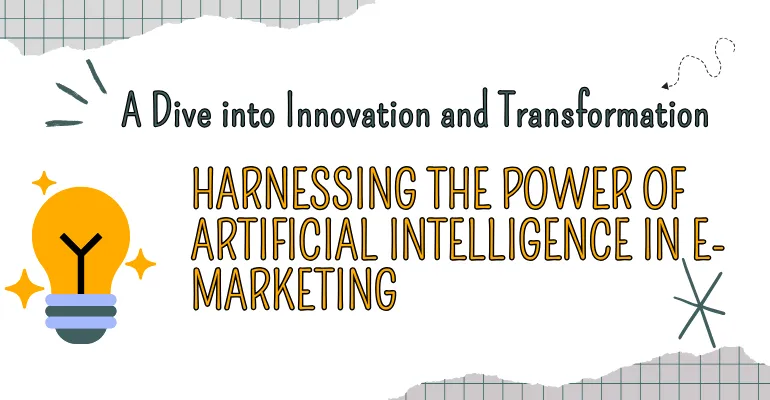
Harnessing the Power of Artificial Intelligence in E-Marketing: A Dive
Artificial Intelligence (AI) has emerged as a game-changer in the realm of e-marketing, revolutionizing how businesses engage with their customers, understand market trends, and drive sales. This article delves into the transformative role of AI in e-marketing, exploring its applications, benefits, and the future prospects of integrating AI into marketing strategies.
Understanding AI in E-Marketing
At its core, AI in e-marketing refers to the use of algorithms and machine learning models to automate and enhance marketing activities. From personalized customer experiences to predictive analytics, AI technologies enable marketers to make data-driven decisions, optimize campaigns, and achieve better outcomes.
Applications of AI in E-Marketing
- Customer Segmentation and Targeting: AI algorithms can analyze vast amounts of data to identify customer segments based on behavior, preferences, and demographics, allowing for more precise targeting.
- Personalization: Through AI-powered recommendation engines, businesses can offer personalized product recommendations, improving customer satisfaction and conversion rates.
- Predictive Analytics: AI can predict future trends and customer behaviors based on historical data, enabling marketers to anticipate market movements and adjust strategies accordingly.
- Chatbots and Virtual Assistants: AI-driven chatbots and virtual assistants provide instant customer service, answering queries, and guiding users through the purchase process, enhancing the overall customer experience.
Benefits of Implementing AI in E-Marketing
- Increased Efficiency and Productivity
By automating repetitive tasks, AI frees up marketers’ time to focus on strategic initiatives, leading to increased productivity and efficiency.
- Improved Customer Engagement
AI-powered personalization and segmentation ensure that marketing efforts are tailored to individual customer needs, resulting in higher engagement levels and customer loyalty.
- Enhanced Decision Making
Data-driven insights from AI analytics empower marketers to make informed decisions, optimizing marketing spend and maximizing ROI.
- Scalability and Accessibility
AI technologies can scale to meet growing demands, providing businesses of all sizes with access to advanced marketing capabilities previously available only to larger corporations.
Challenges and Considerations
While AI offers numerous benefits, its implementation also poses challenges, including:
- Data Privacy Concerns: Ensuring the responsible handling and protection of customer data is paramount.
- Technological Complexity: Integrating AI into existing marketing workflows requires technical expertise and investment.
- Adaptability: Keeping pace with rapid advancements in AI technology and adapting strategies accordingly.
The Future of AI in E-Marketing
As AI continues to evolve, its role in e-marketing is expected to expand, with greater emphasis on natural language processing, computer vision, and deep learning. Marketers will need to stay agile, continually exploring new AI applications to stay competitive.
Conclusion
Artificial Intelligence is poised to redefine e-marketing, offering unprecedented opportunities for businesses to enhance customer engagement, optimize marketing strategies, and drive growth. By embracing AI, marketers can leverage cutting-edge technologies to navigate the complexities of the digital marketplace, ensuring their strategies remain relevant and effective in an increasingly competitive landscape. The future belongs to those who can harness the power of AI to transform their marketing efforts and forge deeper connections with their customers.

























